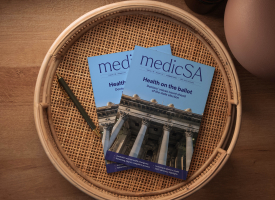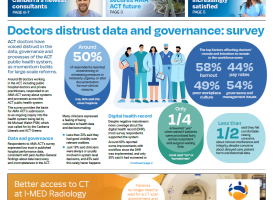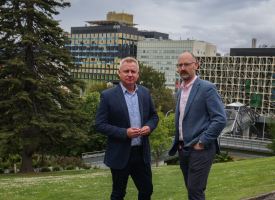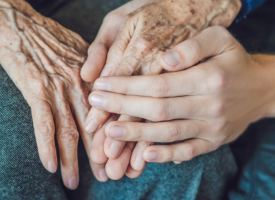AMA Vice President says Federal Government sending mixed messages on COVID
AMA Vice President Dr Chris Moy tells ABC News Breakfast on one hand the federal government is encouraging COVID boosters and making antiviral medicines more accessible, but on the other they've taken away the pandemic payment and cut back on important telehealth consultations
JAMES GLENDAY: From today, all Australians over 30 will be able to get a fourth COVID vaccine as the country battles yet another wave of this pandemic. Health authorities are hoping the fourth jab will give an extra incentive for everyone to have their vaccines up to date, with 30 per cent of eligible Australians still not having had a third dose.
LISA MILLAR: Also, from today, people over 70 who test positive will get access to anti-viral treatments. Experts say the move should ease some pressure on the struggling health care system. Dr Chris Moy is the Vice-President of the AMA, and he joins us now from Adelaide. Chris, great to see you again on the program.
CHRIS MOY: Thanks, Lisa.
LISA MILLAR: How bad is this third wave of COVID?
CHRIS MOY: Look, on behalf of my colleagues, can I just say very clear messages? What we need you to do is to have as many of the COVID vaccines as you are eligible for; to make sure that if you have any symptoms at all of, like, runny nose or sore throat, go get a PCR test as soon as you can because you may be eligible for these anti-viral treatments which are going to be key in reducing your chance of ending up in hospital; and also, wear a mask, if at all possible, indoors - at this stage over the next few months. Because we're facing a really big threat.
I've not heard health authorities so worried for quite a period of time behind the scenes, because we're extremely worried about facing BA4 and 5 Omicron variants which are more infectious, cause more reinfections and more severe disease because they look as though they're more likely to go down to your lungs.
We are facing an increasing number of cases - more people ending up in hospital just when our hospitals are absolutely chock-a-block full because they've been neglected for so long.
LISA MILLAR: And what's gone on with public sentiment, do you think? We were so keen to feel like we were at the end of COVID, we didn't see what was coming
CHRIS MOY: The election gave us a false sense of security. Unfortunately, to some degree, we're being like frogs boiled slowly and we're accepting this death rate, which has continued on. We're just about to enter a much worse phase.
We've also had, somewhat, mixed messaging over the last few days from our politicians, who, on the one hand have been saying, look, we've opened up the extra fourth shot, so if you're over 30, you can get one now. And also, antivirals are open for anybody over 70 and for over 50 if you've got certain risk factors.
But at the same time, there's been a slightly mixed message in terms of the fact that they've cut back on- they won't return to things like the pandemic payments. They've cut back on Telehealth which actually help GPs actually prescribe these antivirals. Also, there's been this discussion which, I think, the only thing people are hearing is, we won't do mask mandates again. But in fact, really masks are a very high impact in terms of benefit with low inconvenience compared to things like isolation intervention, which we can really encourage at the moment
So, as I said before, cut through the noise. We've got more vaccines. Get one if you're eligible, get your antiviral if you can. If that means you have to get tested early with a PCR test - don't rely on your RATs, your RATs are actually only 60 per cent pick up rate at the moment; and you know, really consider wearing a mask in high-risk situations.
Because what we need to do over the next 4 to 8 weeks or 5 to 10 weeks, it's going to be a really high-risk period for us. We just don't want to overload the hospitals because it means, not just risk for people if you get COVID, that's you as well; but also, anybody else who's got any other condition. Because that means you're going to get stuck outside, ramped outside of hospital, unable to get into an emergency department in a really, really dire situation.
LISA MILLAR: Will the antivirals make a difference?
CHRIS MOY: Yes, they will. But the critical thing with them - and it's good that they've been opened up, they- like, Paxlovid, for example, have been shown somewhere in the order of 80 to 90 per cent reduction in severe disease, but you have to get it within five days of developing symptoms.
They do make quite a big difference, but they have to be given early to have the greatest benefit. That means you have to get tested with, as I said, a PCR test. We're seeing a lot of people doing rapid antigen tests and it's taking till day four or five of symptoms before they actually get a positive test which kind of is pointless at that point. It's too late in the game. We need people, if you get symptoms, to go get a PCR test, and in doing so, if you get a positive thing, then you need to follow the advice you've been given or contact your GP to try and organise one of these antivirals.
But you know, there has been some frustration that, unfortunately, the current Government is- the health minister particularly, is acting a little bit more like an economist than a health minister in actually not supporting GPs at the moment properly in prescribing these. Because he's asking us to prescribe a lot more. We've got a challenge out there for him to come down to see one of our local GP's, to actually see how hard it is to actually prescribe these. Because I'm doing these at the end of the day, and Dr Melanie Smith, a local doctor, has put out a challenge for him to come down and see how hard it is.
But look, what we need really at the moment is for people out in the community to understand. Get your shots; get tested so you can get antivirals if you're eligible; and wear a mask if you can. And in terms of behind the scenes, we've just got to get our government to do the right thing at the moment.
LISA MILLAR: Yeah, the federal government is pretty new in the job. But you're feeling like the health minister needs to be doing more right now?
CHRIS MOY: I think he needs to come down and see what it's really like. He probably needs to see what a GP actually does, and he also probably needs to actually visit somebody like the local SACOSS or ACOSS groups and actually see how it's going to be for somebody who develops COVID and you know, is in a financial trouble. And because of that they're worried. If they get symptoms, they won't get a test because they don't have pandemic leave. And because of that, what happens then is, that they either can't get the antiviral and they could get sick. Or in another situation is they go back to work and they continue spreading it around and accelerate the pandemic.
Look, we've been down this line before with the economists running this thing - and particularly New South Wales, and that didn't go very well in two outbreaks. Really at the moment, if we're really serious about a, you know, a really serious time in the next couple of months - which we are - we really need to actually have everything heading in the same direction to try and keep this under the best control possible.
LISA MILLAR: Chris Moy, you're going to have a busy day, so I'm going to let you get back to work Thank you, as always, for making yourself available for News Breakfast.
CHRIS MOY: It's a pleasure.



